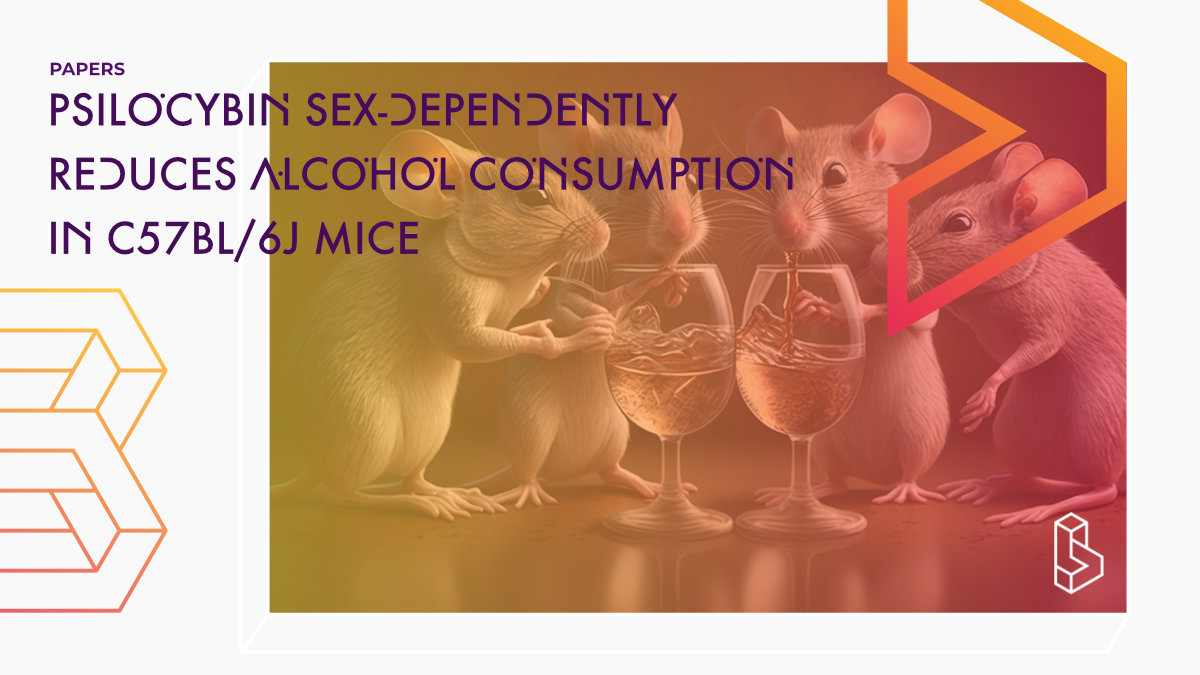This mice study found that psilocybin reduced alcohol consumption for three days, but this effect was only present in male mice.
Abstract
“The classical psychedelic psilocybin is of interest as a treatment for alcohol use disorder (AUD). This study investigated the effects of psilocybin on voluntary ethanol consumption in adult male and female C57BL/6J mice administered saline or psilocybin intraperitoneally as a single dose of 0.1, 0.5, 1.0 or 2.0 mg/kg and provided 20% ethanol utilizing a two-bottle choice alcohol drinking paradigm. Ethanol was provided continuously for 3 days immediately following the administration of psilocybin, then withheld for 2 days, and then provided continuously for two subsequent additional days. A multilevel model (MLM) for repeated measures was used to compare ethanol consumption and preference in psilocybin-treated groups versus controls. Ethanol consumption and preference were reduced in male mice during the 3-day interval that immediately followed psilocybin administration. The effect of psilocybin on ethanol consumption was dose-related and was consistent across the 3-day interval at dosages of 0.5 mg/kg or greater. Psilocybin had no effect on consumption or preference when ethanol was subsequently reintroduced after 2 days of withdrawal. In contrast to males, psilocybin had no significant effect on ethanol consumption or preference in female mice at any dosage or time point. The lack of an effect of psilocybin on quinine preference, and its limited interaction with locomotor activity indicated that the observed reduction in voluntary ethanol consumption was not attributable to altered taste perception or motor effects. Total fluid consumption was increased in males at some time points and psilocybin dosages and unchanged in females, and the absence of any decrease in either group at any time point indicated that the observed reduction in ethanol consumption was not mediated by nonspecific effects on consummatory behavior. The finding of a sex-dependent effect of psilocybin on ethanol consumption suggests that the C57BL/6J mouse may provide a useful experimental approach to modeling sex differences in vulnerability to AUD in addition to investigation of the neurobiological basis of the effect of classical psychedelics on alcohol drinking behavior.”
Authors: Kenneth Alper, Janelle Cange, Ria Sah, Deanna Schreiber-Gregory, Henry Sershen & K. Yaragudri Vinod
Summary of Psilocybin sex-dependently reduces alcohol consumption in mice
LSD and psilocybin are the classical psychedelics studied most often as treatments for alcohol use disorder. Observational and controlled studies indicate a prolonged effect of diminished alcohol use after administering single dosages of a classical psychedelic.
Animal models may offer valuable approaches to target identification and drug discovery in neurobiological investigations of psychedelics as a treatment for AUD. Psilocybin, LSD, ayahuasca, 2,5-dimethoxy-4-iodoamphetamine and DOI were all shown to reduce ethanol self-administration in at least one experimental condition.
Clinical studies of classical psychedelics for the treatment of alcohol use disorder found that the effect of diminished alcohol consumption persisted beyond the time to elimination of the administered test drug.
Find this paper
Psilocybin sex-dependently reduces alcohol consumption in C57BL/6J mice
https://doi.org/10.3389/fphar.2022.1074633
Open Access | Google Scholar | Backup | 🕊
Study details
Compounds studied
Psilocybin
Topics studied
Alcohol Use Disorder
Addiction
Study characteristics
Animal Study

